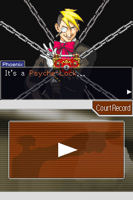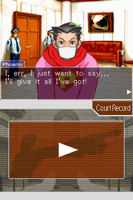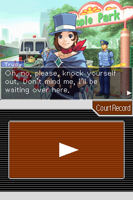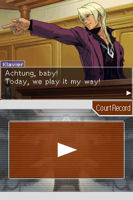Phoenix Wright/Apollo Justice Review (DS)
- Updated: 16th Dec, 2008
I play the Ace Attorney games obsessively. I played Phoenix Wright: Trials and Tribulations and Apollo Justice back-to-back over a couple of month during commutes to work.
I do love this series but there are so many things wrong with it that I find it hard to recommend them to people I don’t know well.
Game Mechanics
The gameplay for Trials and Tribulations is almost exactly the same as Justice For All. This wouldn’t be so bad but for one thing; each chapter has at least one point where there are no hints as to the item you have to present to get the story going. Once you know the story, the item is obvious but that’s the whole problem. You don’t know the story. The only way to figure it out is to present everything at every statement until you finally hit upon the right combo. Sometimes you’ve made the right guess as to the story but picked an item that needs to be shown at a later stage. PENALTY!
 Even worse, these two PW games introduced psyche-locks – during the investigation, you have to persuade characters to spill their innermost secrets by presenting them with the right piece of evidence or character profile. I found these incredibly tedious (though I like the animation and sound that went with it). The psyche-lock segments made the investigation chapters feel just like the courtroom with the added bonus of multiplying the number of times you could get stuck. Not a good thing as I enjoyed the change of pace between research and courtroom.
Even worse, these two PW games introduced psyche-locks – during the investigation, you have to persuade characters to spill their innermost secrets by presenting them with the right piece of evidence or character profile. I found these incredibly tedious (though I like the animation and sound that went with it). The psyche-lock segments made the investigation chapters feel just like the courtroom with the added bonus of multiplying the number of times you could get stuck. Not a good thing as I enjoyed the change of pace between research and courtroom.
In contrast, Apollo Justice did away with the psyche-locks, if not the actual mystery-inventory-item flaws. Instead, you get to do a bit of forensic investigation in the form of fingerprint analysis and the like. We previously saw this in the final DS-only chapter of the first game and it was bloody good. It’s a pity these moments were underused, and just criminal that the only time you got to try them out was when you knew you were going to find something. Still, it was an enjoyable, if fleeting improvement.
The other big change in Apollo Justice was Perception (for want of a better thing to call it). In Bracelet Perception Mode (don’t ask) you can scrutinise the witness’s body language and looks for a “tell” to indicate that they’re lying. This was almost fun but for the fact that you could only look at a tiny part of the witness at a time. Allowing me to zoom out for less detail would have been less frustrating as each character had roughly five testimony statements, three different “phases” to a statement where they could lie and four different body parts that could have a tell.
Characters
(Teeny spoiler here revealing characters that appear in Trials and Tribulations)
The greatest thing about the Phoenix Wright series is the characters that you meet. They’re all quirky and distinctive. So why does Phoenix not grow at all during the first three games? Even by the end of game three, he’s still a self-doubting rookie who needs a sidekick to kick him into action. This was made all the more obvious in the chapter where you get to play Edgeworth, self-confident and in control. Frankly, Edgeworth was just awesome in that chapter and I really hope that Gyakuten Kenji keeps him that way.
(End of spoiler)
I had hoped that new protagonist Apollo Justice would be less timid but noooooooo. Three games of building up Phoenix’s confidence and now you get dropped right back where you started with a rookie attorney who needs to be taught about the Court Record and presenting evidence all over again. Aaaaargh!
In Summary
Not that different from the original game, really. Great storytelling, crappy gameplay. Not a dealbreaker for me but would be for most people I know.
Screenshots





Pingback: Playable demo – Ace Attorney Investigations: Miles Edgeworth | The Average Gamer